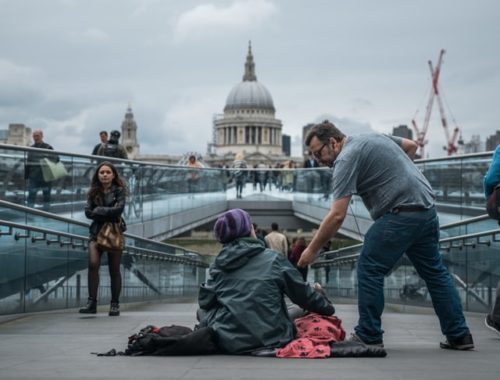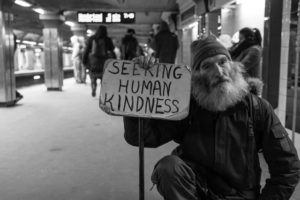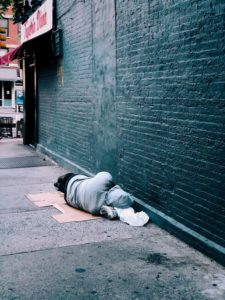320,000 people are homeless in the UK

Posted: 16th Mar 2020
Homelessness is rife in the UK now, to the point that even people who like to bury their head in the sand can no longer do so. Just on the commute to the office people see big issue distributors, a few tents, and people shivering in the cold. The problem is no longer deniable. Seeing your own town failing on a systematic level often causes a mixture of feelings of anger and sadness. Thankfully there are plenty of organisations that are fighting the battle, and there are plenty of things we could be doing as a society to make their troubles a little easier to carry.

Photo by Nick Fewings
What should you do if you see a homeless person?
A warm greeting and some simple small talk can make all the difference and brighten up someone’s day. Take the time to slow down and give them a minute of your time. You never know what you may learn. The person you pass on the streets might not have spoken to anyone that day – just a simple ‘hello, how are you?’ could make an enormous difference. To connect rough sleepers with services that can help in England and Wales, send an alert to StreetLink – an organisation that connects people living on the streets with local authority and outreach teams to get them support.
What help is there to tackle the homelessness problem?
Many charities provide emergency shelter. Centrepoint in London works specifically with young people. The Salvation Army runs hostels, drop-in centres, does frontline work with rough sleepers and offers a wide range of services across the UK. Others, like Crisis, offer support to help people out of homelessness, and Shelter works towards preventing people becoming homeless as well as assisting those who are already homeless. There are many local charities and shelters right across the UK. Supporting these organisations makes a big difference – they are experts and can connect people with the help they need.
Photo by Matt Collamer
How many people are homeless in the UK?
An estimated 320,000 people are homeless in the UK, according to the latest research by Shelter. This equates to one in every 201 Brits and was a 4% increase on the previous year’s number. Rough sleepers are just the visible tip of the iceberg when it comes to registering and understanding the homelessness crisis. Homelessness is not just rough sleeping – it is however the most visible for those who are unaware of the struggles people are going through. It also means people living in temporary accommodation like hostels, B&Bs, sofa surfing, even staying temporarily with friends or relatives. The widening net of poverty and the breakdown of mental health provision means numbers are growing. Between 4,000 and 5,000 people bed down on the streets on any given night, a figure that has almost doubled since 2010.
What is the cause of homelessness? Is it a housing problem?
There are many complex reasons why people become homeless. They include a lack of social or affordable housing, inadequate regulation of rental agreements, redundancy, poor physical or mental health, bereavement, domestic violence, lack of central government funding to councils to deal with housing shortages and cuts in government funding to homelessness services (£1bn in the last decade). It is a public health problem, a social issue and a housing problem.
Photo by Jon Tyson
What are the effects of homelessness?
Poor mental and physical health are the biggest impacts of being homeless – and the age of death for the homeless is significantly lower than for the rest of the population. Specialist homelessness mental health services are either no longer available or very hard to access. Organisations offering addiction services struggle with funding cuts and increased demand. Mental and physical health issues contribute to someone sleeping rough and the longer they do, the worse the problems get.



